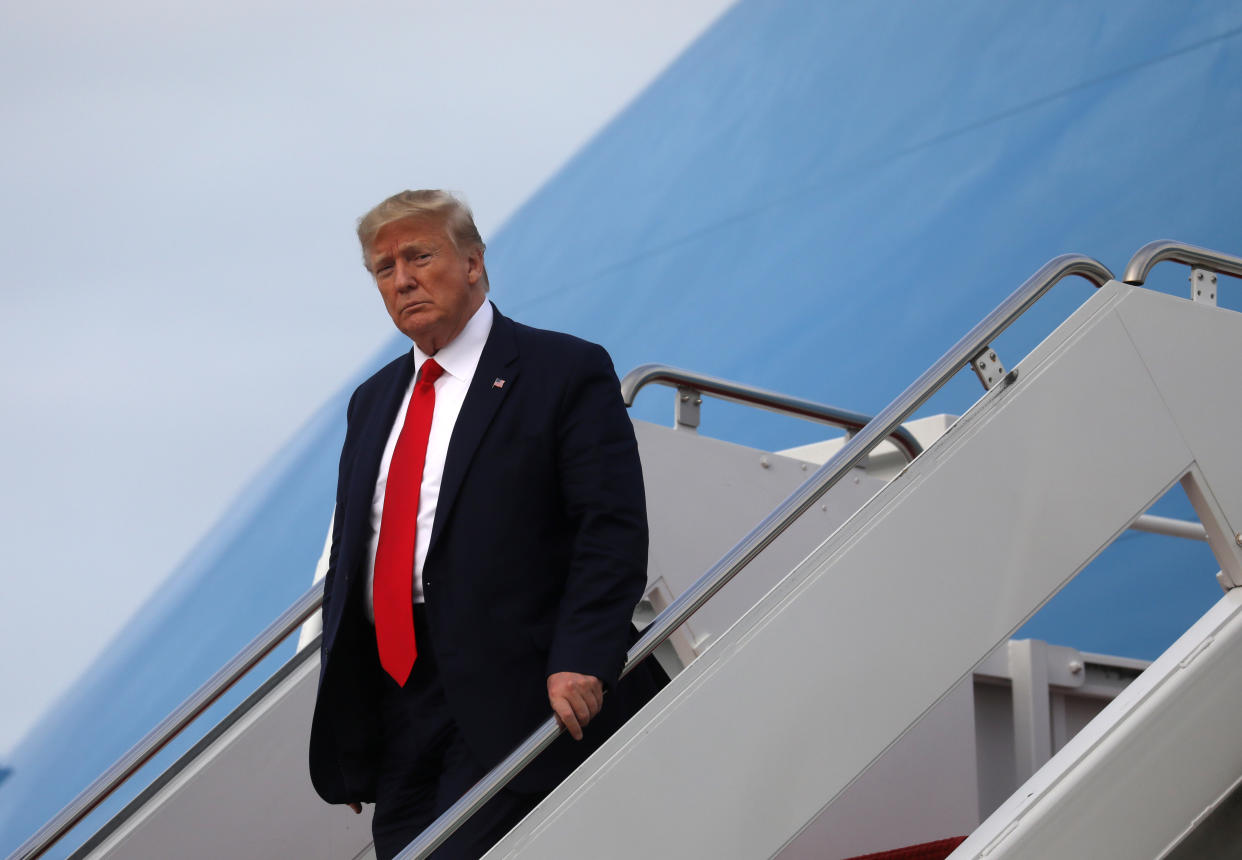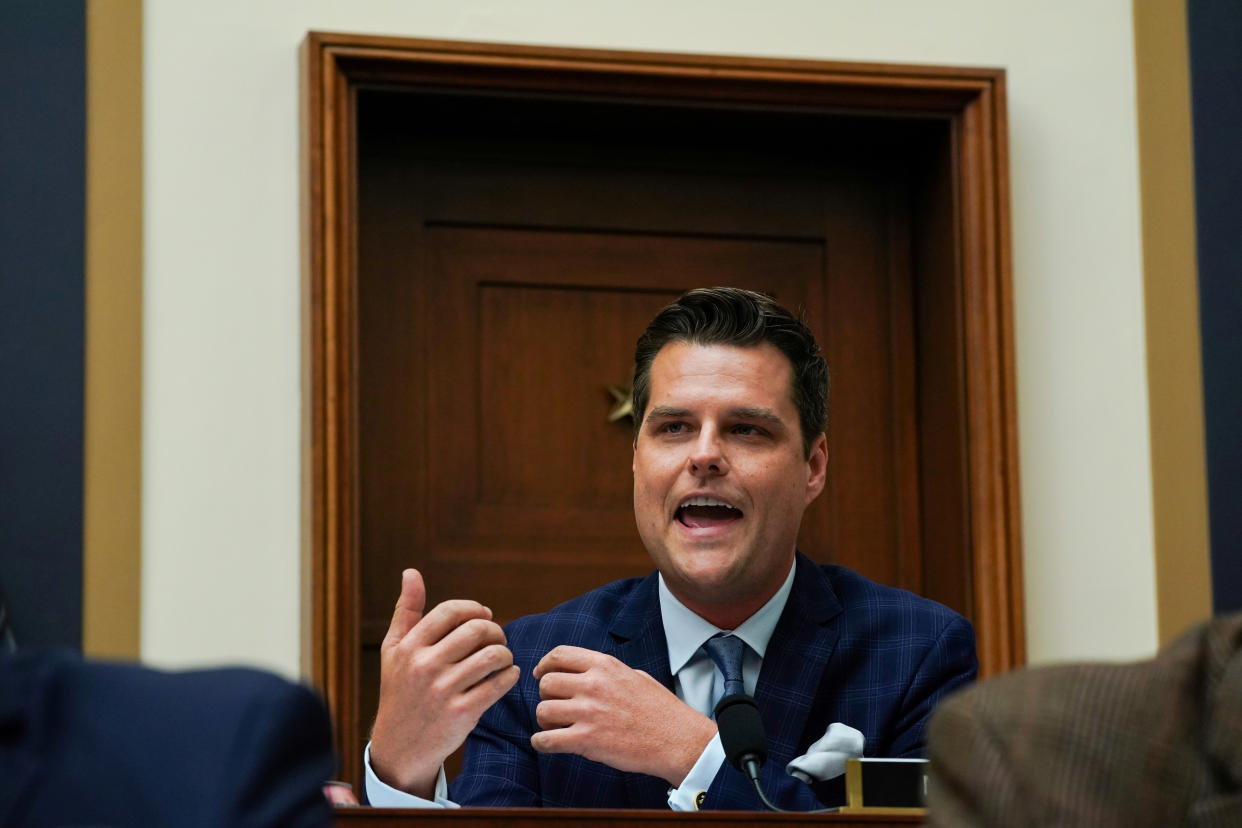Impeachment reveals rifts as GOP argues over how to defend Trump
WASHINGTON — Public support for impeachment of President Trump is rising — and so is anxiety among Republicans who worry that the White House has not done enough to coordinate an aggressive response.
That lack of uniform messaging has led to freelance efforts to help the president, as well as criticism from supporters of the president over what they deem an insufficient strategy to counter Democrats.
On Thursday afternoon, Sen. Lindsey Graham introduced a Senate resolution to condemn House Democrats for the way they have handled the impeachment inquiry into Trump’s attempts to have the Ukrainian government to investigate the family of his political rival, the former Vice President Joe Biden.
A co-author of the resolution was Senate Majority Leader Mitch McConnell, R-Ky., famous for his ability to count votes and discern shifts in political moods. And yet McConnell was not standing alongside Graham as the South Carolina senator argued his case at a press conference. For that matter, neither were any of the more than 40 other Republicans who endorsed the measure, giving what should have been a show of force the feel of a one-man show.
McConnell’s office would not say on record why he didn’t attend the resolution’s announcement. Later reports indicated that some Republicans were uneasy with Graham’s original pro-Trump language, which McConnell worked to soften.
Impeachment proceedings against Trump are entering their most consequential stage yet, with a raft of witnesses slated in the coming days and a House vote on articles of impeachment perhaps only a month away. Even so, Republicans — many of whom face reelection in 2020 — are still struggling to figure out how to defend Trump. There is little consensus about whether to attack impeachment on substance or on process, which is being led by Rep. Adam Schiff, D-Calif., the House Intelligence Committee chairman who is widely despised by the right.

And while some legislators have been vociferous in standing up for Trump, others have laid low. One top Republican operative in Washington told Yahoo News that it was a mistake to not have a single official coordinating an impeachment response from inside the White House.
“The president needs to put one person in charge of the impeachment defense,” the operative said. He added that having White House counsel Pat Cipollone or acting White House chief of staff Mick Mulvaney working on impeachment in addition to the respective responsibilities each already carries was poor management.
“They should not be running this,” he said of the two men, who are said to be vying for influence over how to handle impeachment.
The lack of a central Republican strategy much was in evidence Friday morning, when Rep. Matt Gaetz, R-Fla., appeared on “War Room: Impeachment,” the new impeachment-focused radio show hosted by Steve Bannon, the former White House chief political strategist. Bannon launched the show earlier this week out of frustration with what he saw as a disorganized, unfocused response to what he sees as a grave threat to Trump’s presidency.
“No more just taking punches,” Bannon said at the opening of Friday’s episode, in what could serve as the program’s theme.
Bannon showered praise on Gaetz, who earlier this week led a Republican storming of the secure basement room in the U.S. Capitol, where witnesses were testifying in front of the impeachment panel. While the president’s critics saw the move as little more than a disruptive stunt, loyalists like Bannon were thrilled to watch members of Congress come so forcefully to Trump’s defense.
Two days later, Gaetz said he had no regrets. “I thought we worked ’em pretty silly,” he said, describing how surprised Democrats were to see a gang of Republicans making its way through the door of a secure facility where intelligence matters are often discussed well out of public view. “It was almost like watching cockroaches scatter when you turn the lights on,” Gaetz said of his Democratic foes.

Notably absent from the show of force was House Minority Leader Kevin McCarthy, the chamber’s leading Republican — a fact that was not lost on Bannon. After the Gaetz action was concluded, Bannon criticized McCarthy for a “60 Minutes” interview in which, according to Bannon, McCarthy came off as a “complete and total buffoon” who was unprepared to discuss the details of the impeachment inquiry.
McCarthy, Bannon added, needed to “jump in here and get engaged.”
One Republican staffer on Capitol Hill cautioned against drawing conclusions about fractures in the Republican conference.“I’ve rarely seen our caucus this riled up. We’re totally united in fighting Schiff’s secret impeachment,” the staffer added. “Across the board, members think this whole thing is a farce, and you’ll see little dissent from that view.”
The staffer acknowledged that “Senate Republicans are quieter,” but so were, in his estimation, Democrats in the upper chamber, with both parties “keeping their powder dry over there.”
As for McCarthy, a spokesman said that he supported Gaetz’s effort, even if he wasn’t present for it. “House Republicans are speaking with one voice against the undemocratic impeachment process,” the spokesman said, pointing to efforts like a resolution to censure Schiff that was introduced by Rep. Andy Biggs, R-Ariz., and roundly supported by this Republican colleagues.
GOP fractures, however, extend beyond the House. After all, that chamber is controlled by Democrats. The Senate and White House, meanwhile, are in Republican control, making them natural epicenters of pro-Trump impeachment initiatives. But so far, such initiatives have been limited.
Graham acknowledged as much during Thursday’s press conference. “What's missing here, I think, is that coordinated effort to put somebody in charge of developing a message and delivering it,” Graham said. “I believe that's about to be corrected, I hope.”

Speaking to that same point, Gaetz said on Bannon’s show that he disagreed with Mulvaney, who last week told reporters that Trump did not need to institute a concerted, coordinated anti-impeachment effort stemming from the White House. “You don’t have a war room when you haven’t done anything wrong,” Mulvaney said, in what has been widely described as a disastrous appearance in the White House press briefing room.
“We’ve got to bring back the killer class,” Gaetz said, eliciting laughter from Bannon. “We need the killers, OK? We are not going to win this impeachment at a K Street martini party,” he added, using shorthand for establishment Washington.
At one point, Bannon’s co-host, Jason Miller, a former top Trump campaign official, referred to the Florida congressman as “Speaker Gaetz,” suggesting that 37-year-old had become the de facto leader of the Republican conference in the House. Later in the show, Bannon called him “the future speaker of the House.”
As Bannon interviewed Gaetz, a CNN screen behind him relayed news that former treasury official Tony Sayegh had been selected by the White House to lead its messaging strategy on impeachment. Sayegh is a favorite of Bannon and his allies, and Bannon speculated that his name had been leaked by powerful detractors within the White House in order to harm the potential hire.
That same morning, Axios reported that an informal war room was meeting in the White House, though it consisted of extant staff, not new hires. One detail from the report bothered Bannon: the time of the daily war room meetings.
“Hey guys, note to self, 10 o’clock, the day is over,” Bannon joked. “Why don’t we start meeting at 6 or 7 in the Roosevelt Room? Make it focused over there. Ten o’clock? Isn’t that lunch?”
_____
Download the Yahoo News app to customize your experience.
Read more from Yahoo News:

